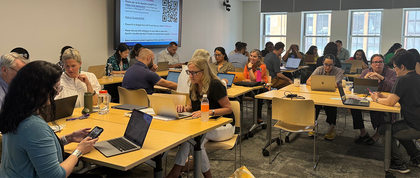
Artificial Intelligence (AI), with its transformative potential, is poised to revolutionize the public health landscape and our daily work in academic public health. Faculty, staff and students attended a workshop about this transformative tool led by Dr. Madhu Mazumdar, Director of the Institute for Healthcare Delivery Science at the Mount Sinai Health System and Professor of Biostatistics at the Department of Population Health Science and Policy Center of Biostatistics. The workshop delved into AI’s role in evolving crucial projects, from identifying patients with diabetic retinopathy in underserved areas in rural India, to assisting faculty in composing emails that maintain precision and kindness even when time is limited.
Over 30 attendees had the opportunity to collaborate on prompt engineering for various projects, such as creating a course syllabus on sexually transmitted infections, identifying errors in dense text blocks, and proposing a research thesis. Following the activity, attendees engaged in robust conversation about the perceived benefits and drawbacks of the various AI tools. Their shared experiences brought forth curiosity, laughter and provocative comments. One attendee disclosed working with a small team abroad and utilizing AI to research a scarcely known topic. To her surprise, Chat GPT generated an article written by herself, word for word! Another attendee voiced concerns about residents potentially utilizing Gemini to generate patient evaluations by imputing displayed symptoms, and wondered whether this practice is ethical.
Skepticism aside, AI’s prevalence shows no signs of slowing down anytime soon. As highlighted by Dr. Mazumdar, “We are the humans and will ultimately be held as the responsible party.” So as public health professionals, we must ask ourselves…How do I use AI in my work? What is the potential for AI to help improve public health practice?